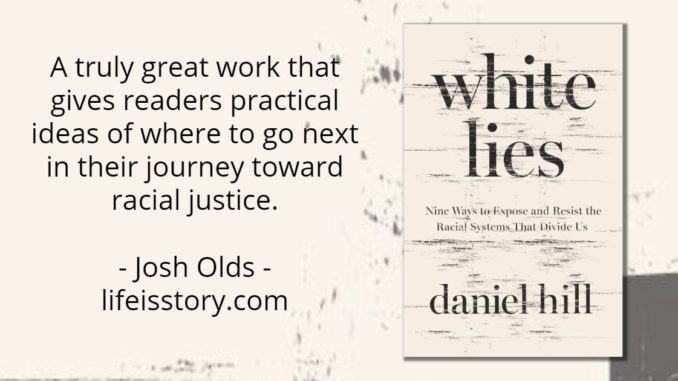
Published by Zondervan on September 1, 2020
Genres: Non-Fiction, Christian Life, Racial Reconciliation
Buy on Amazon
Goodreads

What can you do to be a force for racial justice?
Many White Christians are eager to fight against racism and for racial justice. But what steps can they take to make good, lasting change? How can they get involved without unintentionally doing more harm than good?
In this practical and illuminating guide drawn from more than twenty years of cross-cultural work and learning from some of the greatest leaders of color, pastor and racial justice advocate Daniel Hill provides nine practices rooted in Scripture that will position you to be an active supporter of inclusion, equality, and racial justice. With stories, studies, and examples from his own journey, Hill will show you:
How to get free of the impact of White supremacy individually and recognize that it works systemicallyHow to talk about race in an intelligent and respectful way How to recognize which strategies are helpful and which are harmfulWhat you can do to make a difference every day, after protests and major eventsWe cannot experience wholistic justice without confronting and dismantling White supremacy. But as we follow Jesus--the one who is supreme over all things--into overturning false power systems, we will become better advocates of the liberating and unconditional love that God extends to us all.
I have to admit that I wasn’t sure about White Lies. I had the same feeling when I read through White Fragility by Robin DiAngelo? With so many people of color—Jemar Tisby, Brenda Salter McNeil, Ibram Kendi, Austin Channing Brown, Ijeoma Oluo, and the list goes on—speaking about their own experiences and their own perspectives, what value is there in a white guy reading about what a white guy thinks about racial justice?
And while I would still elevate the voices of those facing injustice over those who benefit from systemically racist systems, Daniel Hill provides the perfect example for why white allies (or whichever term you feel is appropriate) should use their voices and platforms and speak out. Hill doesn’t come at White Lies with a sense of authority or mastery, but with a sense of sharing what he has learned from his own experience in racial justice advocacy.
The book’s structure makes it easy to follow and Hill’s careful use of language and inclusion of personal anecdotes make for a clear, relatable, and sound approach to resisting the racial systems that divide us. Hill identifies nine different practices that people can take to expose these systems and begin the work of tearing them down.
Some of these practices are obvious from the beginning; others are less so, and hit at determining the proper motivations for doing the work of racial justice. I really appreciate that Hill begins with these, shaking white liberals out of complacency or a sense of authority. “Stop Being Woke” sets the tone by identifying the problems of “wokeness.” Of course, while this term can be used positively, it is becoming increasingly associated with the type of social justice that is done for ulterior motives. Woke White people feel like they’ve learned all they can about racial justice and may not be open to people of color teaching them about their blind spots. Awakening White people recognize that the movement toward racial justice is a daily, continuous movement of listening and learning from our BIPOC brothers and sisters.
The second practice is to beware of diversity. Using his background as a former pastor at Willow Creek Community Church—a predominantly White megachurch—Hill explains the danger of a false diversity that is really about assimilation. He writes that while the church sought to include BIPOC into their church services, nothing was done to uphold or promote their culture or place them in positions of power. There was an expectation of assimilation into White culture, not a desire for true diversity.
The third practice teaches us to clearly define race as a social construct that operates through a narrative of racial hierarchy and inflicts its damage primarily through systems. This foundation gets us back to recognizing all people as made in the image of God, that racist philosophies are stories within our culture that we can change, and that the change is done not primarily through individual redemption but the resetting of entire social systems.
Step by step, practice by practice, White Lies exhorts readers to truthfully and honestly examine their lives, their faith, their politics, and their social systems and pinpoint where they see inequities and biases. As a pastor, Daniel Hill infuses the whole work with a strong theological background, repeatedly pointing toward white supremacy as supernatural evil that must be fought on those grounds as well as within society. This reframing of racial justice as a spiritual issue is something that has been mostly missing from the conversation that I personally found very enlightening in helping me engage my Southern White Bapti-costal community.
White Lies is the book I would give to a White Christian who told me they wanted to learn about racial justice. Because it’s his own experience, Hill is sensitive to the cultural biases and triggers that often cause White people to stop listening. His pastoral tone is firm, yet full of grace. And he gives ample space to talk about or quote directly many (if not all) of the BIPOC authors I mentioned above. It’s a truly great work that gives readers practical ideas of where to go next in their journey toward racial justice.



